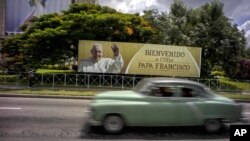When John Paul II became the first pope to visit Cuba in 1998, Miami's large Cuban exile population recoiled at the prospect of the pontiff giving his blessing to the island's communist leaders.
Now, 17 years later, there is barely a whiff of protest from Miami Cubans as Pope Francis prepares to make the third papal trip to the island.
Instead, a mood of curiosity surrounds his Sept. 19-22 visit. Cubans in Miami are eager to see how Francis will handle the authorities on the island, particularly given his pivotal role encouraging a diplomatic warming between Washington and Havana after more than half a century of hostilities.
The U.S.-Cuba rapprochement, announced last December, has raised expectations for political and economic change on the island.
"This is an impactful pope and he's coming at a good time," said Miami lawyer Pedro Freyre, a Cuban-born Catholic. "He has a common touch and that's going to play extremely well in Cuba."
The papal trip, encompassing visits to Cuba and then the United States, is a "symbolic gesture" showing the pope believes he still has a role to play in nudging the two sides closer, said Miami's Archbishop Thomas Wenski.
Not least, Francis' visit to Cuba is a spur for some 189 pilgrims from the United States — including Wenski — to attend the pope's Masses there.
'A new way forward'
Among the Miami pilgrims is Martha Serra, 56, who is battling pancreatic cancer and who will be making her first trip back to Cuba in 46 years.
"This is an opportunity for Cubans of all walks of life to come together and pave a new way forward," said her son Felice Gorordo, co-founder of Roots of Hope, a group of Cuban-American young professionals who support engagement with the island.
The pope's theme for his Cuba visit, "Missionary of Mercy," was chosen to emphasize the need for reconciliation between Cubans in Cuba and in the United States after decades of hatred and mistrust, Wenski said in an interview.
"The church understands in order to have a peaceful transition, one without chaos, there has to be some reconciliation and a change of the culture," he said.
Since the 1959 revolution led by Fidel Castro, an estimated 1.7 million Cubans have left the island, more than 17 percent of its current population.
The older generation of migrants, in particular, long pushed for Washington to isolate Cuba. Some hard-line exiles have criticized the pope's support for President Barack Obama's move to normalize relations.
The pope "has shown a left-wing tendency and a disdain for capitalism," said Ninoska Perez, a Cuban exile radio host, who urged Francis to speak out on Cuba's "appalling" human rights record.
Accent on healing
Francis is unlikely to take any overtly political stands on his trip, Wenski said, but he will not shy away from prodding both sides to heal old wounds, including ending the long-standing U.S. economic embargo on Cuba.
Wenski voiced support for the church in Cuba, saying its strategy of working for a "gradual transition" was preferable to seeking an implosion of the Cuban government, even if some exiles wanted to see faster change.
Cuba's weak civil society outside the sphere of the ruling Communist Party has made the church the only significant nongovernmental player. After struggling for decades under atheistic rule, the church has slowly regenerated since the 1990s, boosted by papal visits.
That has made some Miami Cubans optimistic about its influence and that of the Argentine-born pope, in terms of bringing about political change.
"The Catholic Church is Cuba's only solution," said Rosario Perez, 73, among thousands of faithful who packed a Miami basketball arena last week for an annual celebration of the Virgin of Charity, Cuba's patron saint.
Violeta Mosquera, 55, who left Cuba in 1980 and sells Catholic cemetery burial plots in Miami, said the pope knows how to reach the people.
"I just hope he can change the mind of the government," she added. "I'd like to go back one day."





